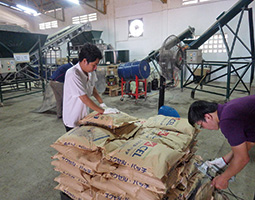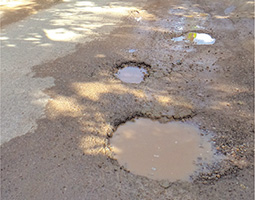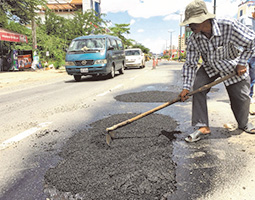Home > Highlighting JAPAN > Highlighting Japan January 2018 > SMEs Overseas
Highlighting JAPAN
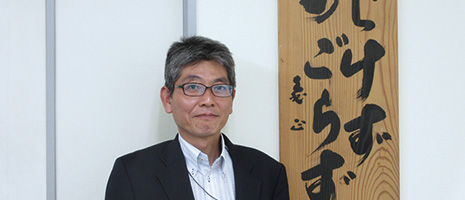
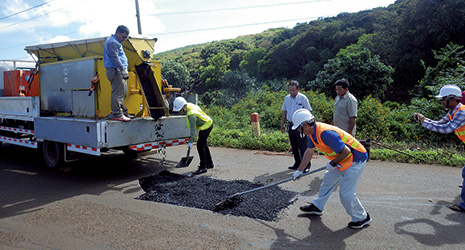
New Roads for Cambodia
A Japanese small and medium-sized enterprise (SME)’s road pavement technology and expertise is contributing to the development of safer roads in Cambodia with a minimized environmental impact.
IKEE Co., Ltd. is headquartered in Matsuyama City, Ehime Prefecture, and its main business is road pavement construction. The company and nine affiliated group companies that engage in the manufacture and sales of construction materials and the construction of buildings have a total of 300 employees. They say that they are “the specialists on township infrastructure,” and the entire group engages in construction-related business that is closely linked with the local areas. In 2016, this company group established a new local company in Cambodia.
In Cambodia, there are areas where there are still landmines that were buried in the 1980s during the civil war. Because a Japanese man who engages in landmine removal was from Ehime Prefecture and happened to be an acquaintance of the President of IKEE, the company started accepting young Cambodians as trainees a few years ago.
Masaaki Okamoto of the Overseas Department of IKEE says, “We have heard from the trainees that road pavement repair is currently a significant issue in Cambodia. Because we have the proper technologies, we decided to introduce them to Cambodia. We applied to the project of Support for Japanese SMEs Overseas Business Development of the Japan International Cooperation Agency (JICA).”
In response to JICA’s adoption of the initiative, IKEE started a local feasibility survey in 2014. In Cambodia, the traffic has become heavier due to rapid economic development. In this situation, many vehicles are overloaded, which places serious burdens on paved roads. There are numerous accidents because drivers snake through the streets to avoid holes in the roads and drive dangerously, such as by braking abruptly. In Cambodia, to repair these holes, regardless of whether they are small or large, people traditionally repaved the roads by enlarging the road holes so that machines could be used. These repairs take a long time, and it is difficult to stop the traffic for so long. In addition, if rainwater accumulates in the holes, the usual repair work cannot be conducted. In Cambodia, which has a tropical monsoon climate, if the holes are left as they are during the rainy season, there is also a problem that they become larger and larger.
To address this situation, IKEE test-constructed its own all-weather pavement repair material Excel, a cold mix asphalt, under the direction of the Cambodian Ministry of Public Works and Transport (MPWT). Excel uses asphalt to which a special additive is added. Its main characteristic is that it hardens if pressure is applied to it. If there is a hole of up to one meter in diameter, it can finish the process being covered by applying Excel and stepping on it. As vehicles drive over it, the pressure helps strengthen the repaired parts. Even without using a special machine tool, it is possible to achieve extremely durable repairs. In addition, unlike standard asphalt, which hardens through the volatilization of oil that is added, Excel can be used even if there is rainfall and puddles. It is not necessary to apply heat with a gas burner when the construction work is finished. Regular follow-up surveys are conducted for roads for which Excel was test-constructed. The condition of the roads is very good, even in the rainy season.
In February 2016, IKEE was adopted for a verification survey of JICA, and IKEE established a local company in Cambodia as the base for future business. Excel is currently being test-constructed on highways in twenty-five provinces that are supervised by MPWT. IKEE’s repair material-manufacturing facility was transferred to MPWT through JICA, and MPWT’s operation will begin when the survey is completed. With a focus on the increased demand for road repairs in the future, IKEE plans to make provision by establishing its own local factories. If this occurs, IKEE will be able to reduce the prices of repair materials, which is an immediate issue.
JICA’s verification survey is scheduled to be completed in March 2018. However, MPWT is asking IKEE for technical cooperation in the future.
Okamoto says, “We have heard that because there are still numerous earth roads in the Cambodian countryside, people fall off their motorcycles at night. We can apply our originally developed roadbed treatment method for simple pavements.”
Fundamentally speaking, roadbed treatment is a method of stabilizing the foundations of the pavement. But IKEE’s method can facilitate sufficient strength and durability by using special emulsified asphalt and cement. For a significant advantage, because IKEE’s method is about raking in earth and gravel using an original heavy machine tool and reusing them as material, it does not need new crushed stones.
Okamoto says, “In Cambodia, including its capital Phnom Penh, neighboring mountains were cut to build paved roads in the past. Our method enables the mountains to be preserved.”
Safe roads can contribute to achieving safe traffic, improved distribution and further economic development. To expand the number of safe roads in Cambodia, there are increasing expectations for IKEE’s technologies with a smaller environmental load.
© 2009 Cabinet Office, Government of Japan
